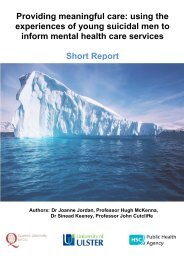Saving Mothers' Lives: - Public Health Agency for Northern Ireland
Saving Mothers' Lives: - Public Health Agency for Northern Ireland
Saving Mothers' Lives: - Public Health Agency for Northern Ireland
Create successful ePaper yourself
Turn your PDF publications into a flip-book with our unique Google optimized e-Paper software.
80<br />
4 Haemorrhage<br />
More than half of the women were from ethnic minorities and several spoke no English. This extra barrier<br />
made the provision of care <strong>for</strong> these women more diffi cult. However, unusually, compared with most other<br />
causes of Direct maternal deaths, all but two of the women received regular and timely antenatal care<br />
and were also in stable relationships with at least one partner in full time employment. At least three of the<br />
women were professionally qualifi ed health care workers.<br />
In previous Reports some deaths from haemorrhage followed concealed pregnancies or a lack of<br />
engagement with the maternity services. This is also the case this triennium. For example:<br />
A single woman whose previous children were in the care of social services concealed her pregnancy<br />
until she attended in spontaneous labour. She discharged herself almost immediately after an<br />
apparently uneventful delivery, leaving her baby behind. She died, alone, of a postpartum bleed<br />
several days later, having made herself impossible to trace <strong>for</strong> community midwifery follow-up.<br />
Although very little could have been done to help this woman, who seemed determined to avoid all contact<br />
with any heath or other agencies, there are lessons to be learnt from the care of another woman whose<br />
antenatal care was less than optimal:<br />
A grand multiparous woman who spoke no English was referred to the local maternity services <strong>for</strong><br />
booking by her General Practitioner (GP) in a timely manner. She did not receive a date <strong>for</strong> her fi rst<br />
antenatal appointment, however, until she was more than fi ve months pregnant. Her pregnancy<br />
proceeded well until labour was induced despite a clear history of precipitate labours. She suffered<br />
a massive postpartum haemorrhage and died, despite a hysterectomy, some days later.<br />
The health system let this woman down because, despite her prompt action when she discovered she was<br />
pregnant, she did not receive her booking appointment until well after the fi rst trimester of her pregnancy,<br />
thus missing the benefi ts of early antenatal care and opportunities <strong>for</strong> screening. She was then further let<br />
down both by poor clinical decision-making and an additional lack of immediate access to Critical Care.<br />
Women who refused blood products<br />
Two women who died from haemorrhage declined blood transfusion due to their religious beliefs. This was<br />
their free choice. However, it is almost certain that if they had received blood products they would have<br />
survived. One other woman who refused blood products died of an amniotic fl uid embolus and her case is<br />
counted and discussed in Chapter 5. Despite their care being generally of a high standard, there are some<br />
general points in the care of these women that need to be re-emphasised:<br />
• Consultant obstetric and anaesthetic involvement is necessary during the antenatal period in order<br />
to develop a care plan together with the woman, her husband and family, and, if necessary, religious<br />
advisors, should any diffi culty occur.<br />
• In<strong>for</strong>med consent <strong>for</strong> red blood cell salvage during surgery and infusion of salvaged blood should<br />
be sought and clearly recorded in the case notes. This facility should be provided <strong>for</strong> all women who<br />
give consent <strong>for</strong> this procedure.<br />
• All women who are known to have stated a wish not to receive blood products should be seen by a<br />
consultant obstetrician and anaesthetist at the onset of their labour and a fi nal care plan developed. In<br />
the past some women who died of post-operative haemorrhage were delivered by caesarean sections<br />
carried out by trainee obstetricians. It is there<strong>for</strong>e important that, whenever possible, each woman in<br />
labour should be cared <strong>for</strong> by a consultant obstetrician and, should an elective caesarean section or other<br />
operative delivery be required, this should be conducted by a consultant obstetrician and anaesthetist.



